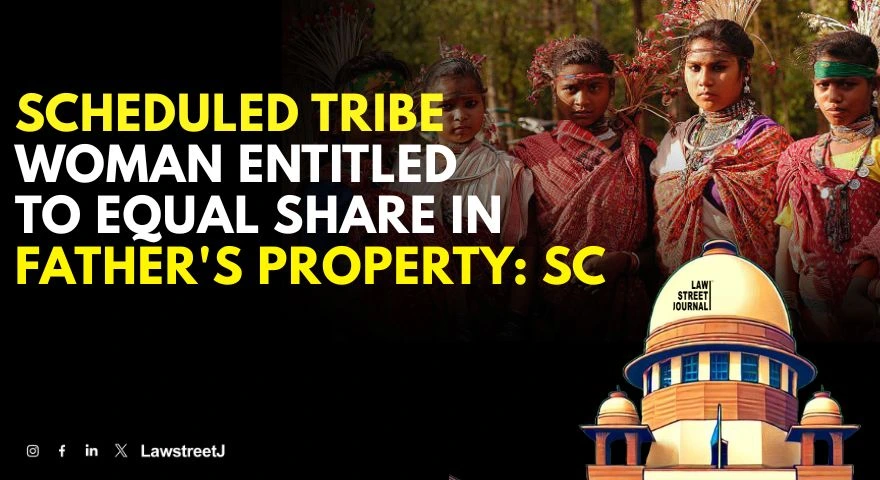NEW DELHI: The Supreme Court has ruled that a woman from Scheduled Tribe community would be entitled to an equal share in ancestral property, in conformity with the principles of equality, non discrimination enshrined under the Constitution.
"Unless otherwise prescribed in law, denying the female heir a right in the property only exacerbates gender division and discrimination, which the law should ensure to weed out," a bench of Justices Sanjay Karol and Joymalya Bagchi said.
The court also said this was a question of violation of Article 14 of the Constitution.
"There appears to be no rational nexus or reasonable classification for only males to be granted succession over the property of their forebears and not women, more so in the case where no prohibition to such effect can be shown to be prevalent as per law," the judgment said.
The court also pointed out Article 15(1) of the Constitution stated that the State would not discriminate against any person on grounds of religion, race, caste, sex or place of birth. This, along with Articles 38 and 46, points to the collective ethos of the Constitution in ensuring that there is no discrimination against women, the court highlighted.
The court allowed a civil appeal filed by Ram Charan and others, the legal heirs of one Dhaiya, a woman belonging to a Scheduled Tribe, while applying the principle of 'justice, equity and good conscience'.
The bench said, it was of the firm view that in keeping with the principles of justice, equity and good conscience, read along with the overarching effect of Article 14 of the Constitution, the appellant-plaintiffs, being Dhaiya’s legal heirs, are entitled to their equal share in the property.
Considering the matter, the bench said, "One would think that in this day and age, where great strides have been made in realising the constitutional goal of equality, this court would not need to intervene for equality between the successors of a common ancestor and the same should be a given, irrespective of their biological differences, but it is not so."
Though the appellants claimed they have adopted Hindu customs and way of life, the court said this was no longer in play here as Section 2(2) of the Hindu Succession Act, 1956 unequivocally excluded from its application, Scheduled Tribes.
The court also noted, in the discussion of customs, the courts below proceeded on misplaced assumption that the daughters would not be entitled to any inheritance and expected the appellant-plaintiffs to prove otherwise.
"An alternate scenario was also possible where not exclusion, but inclusion could have been presumed and the defendants then could have been asked to show that women were not entitled to inherit property. This patriarchal predisposition appears to be an inference from Hindu law, which has no place in the present case," the bench said.
Since neither any particular law of a community nor custom could be brought into application by either side, the court held the principle of ‘justice, equity and good conscience’ can be applied here.
The appellants contended that their mother, one of the six children - five sons and one daughter, was entitled to an equal share in the scheduled property of their maternal grandfather.
The court said, a woman or her successors, if the views of the lower courts are upheld, would be denied a right to property on the basis of the absence of a positive assertion to such inheritance in custom.
"However, customs too, like the law, cannot remain stuck in time and others cannot be allowed to take refuge in customs or hide behind them to deprive others of their right," the bench said.
The bench also underscored the "most commendable" step taken under the Hindu Law by way of the Hindu Succession (Amendment) Act, 2005 which made daughters the coparceners in joint family property.
"Granted that no such custom of female succession could be established, but nonetheless it is also equally true that a custom to the contrary also could not be shown in the slightest, much less proved. That being the case, denying Dhaiya her share in her father’s property, when the custom is silent, would violate her right to equality vis-à-vis her brothers or those of her legal heirs vis-à-vis their cousin," the bench said.















